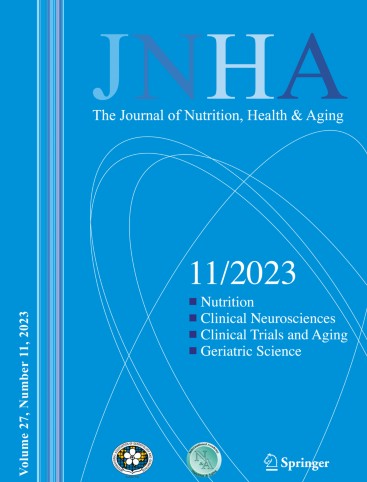Breakfast consumption behavior was positively associated with cognitive function in Chinese adults aged 55 years and above
IF 4
3区 医学
Q1 GERIATRICS & GERONTOLOGY
引用次数: 0
Abstract
Objectives
This study aims to investigate the relationship between breakfast consumption behavior and cognitive function in Chinese adults aged 55 years and above, and the mediating effect of diet quality.
Methods
Data were drawn from the China Health and Nutrition Survey (CHNS) 1997, 2000, 2004, 2006, 2015, and 2018. Participants aged 55 years and above who had at least two waves of completed data on dietary measures and cognitive assessments were eligible. Breakfast consumption behavior was counted during the 3-day 24-h survey period and classified into breakfast skipping and breakfast consumption. Cognitive function was examined using part items of the Telephone Interview for Cognitive Status-modified. Three-level linear mixed-effects models were performed to examine the relationship between breakfast consumption behavior and cognitive function due to the repeated-measured data. The Mediating effect of diet quality, indicated by the China Elderly Dietary Guidelines Index 2022 (CDGI 2022-E), was explored.
Results
A total of 5462 participants were included. Significant associations between breakfast consumption behavior and global cognitive score (breakfast skipping vs. consumption: β = −0.77, 95%CI: −1.23, −0.31) as well as global cognitive composite z-score (breakfast skipping vs. consumption: β = −0.22, 95%CI: −0.30, −0.15) were observed in total participants. Similar significant associations were found in participants stratified by age at baseline or gender. Overall diet quality assessed by CDGI 2022-E played a modest mediating role between breakfast consumption behavior and cognitive score.
Conclusions
Habitual breakfast consumption may have the advantage of improving cognitive function in the Chinese older population, in which overall diet quality exerted a mediating effect.
在55岁及以上的中国成年人中,早餐消费行为与认知功能呈正相关
目的探讨中国55岁及以上成年人早餐消费行为与认知功能的关系,以及饮食质量的中介作用。方法数据来源于1997年、2000年、2004年、2006年、2015年和2018年中国健康与营养调查(CHNS)。年龄在55岁及以上的参与者在饮食测量和认知评估方面至少有两波完整的数据是符合条件的。统计3天24小时调查期间的早餐消费行为,分为不吃早餐和吃早餐。认知功能测试采用认知状态修正电话访谈的部分项目。由于重复测量的数据,采用三水平线性混合效应模型来检验早餐消费行为与认知功能之间的关系。以《中国老年人膳食指南指数2022》(CDGI 2022- e)为指标,探讨膳食质量的中介作用。结果共纳入5462名受试者。在所有参与者中,早餐消费行为与整体认知得分(不吃早餐vs.消费:β = - 0.77, 95%CI: - 1.23, - 0.31)以及整体认知复合z得分(不吃早餐vs.消费:β = - 0.22, 95%CI: - 0.30, - 0.15)之间存在显著关联。在按基线年龄或性别分层的参与者中也发现了类似的显著关联。CDGI 2022-E评估的整体饮食质量在早餐消费行为与认知评分之间起适度的中介作用。结论常规早餐可能对老年人认知功能有改善作用,其中整体饮食质量起中介作用。
本文章由计算机程序翻译,如有差异,请以英文原文为准。
求助全文
约1分钟内获得全文
求助全文
来源期刊
CiteScore
7.80
自引率
3.40%
发文量
136
审稿时长
4-8 weeks
期刊介绍:
There is increasing scientific and clinical interest in the interactions of nutrition and health as part of the aging process. This interest is due to the important role that nutrition plays throughout the life span. This role affects the growth and development of the body during childhood, affects the risk of acute and chronic diseases, the maintenance of physiological processes and the biological process of aging. A major aim of "The Journal of Nutrition, Health & Aging" is to contribute to the improvement of knowledge regarding the relationships between nutrition and the aging process from birth to old age.

 求助内容:
求助内容: 应助结果提醒方式:
应助结果提醒方式:


